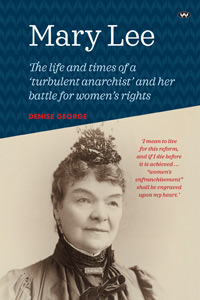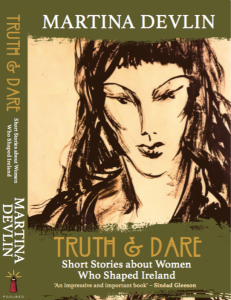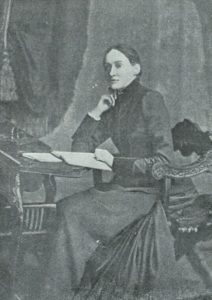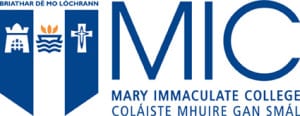Book Review: Mary Lee: The Life and Times of a ‘Turbulent Anarchist’ and Her Battle for Women’s Rights
Sharon Crozier-De Rosa
Mary Lee: The Life and Times of a ‘Turbulent Anarchist’ and Her Battle for Women’s Rights by Denise George (South Australia: Wakefield Press, 2018 270pp. $34.95) ISBN: 9781743055960 in Lilith: A Feminist History Journal, Number 25, 2019, pp.109-110.

As a female who similarly migrated from Armagh to Adelaide, and who came to be interested in woman suffrage – researching and writing about it rather than having to actively campaign for it, thankfully – I have always been intrigued by the figure and life of Mary Lee. With this book, Denise George uses her considerable skills to flesh out the life of this little-known activist. What results is a beautifully written, interconnecting biography of Mary Lee with a history of South Australia and its woman suffrage movement.
Read MoreResearch Pioneers 2: Heather Ingman and Clíona Ó Gallchoir
2018 saw the landmark publication of Heather Ingman and Clíona Ó Gallchoir’s A History of Modern Irish Women’s Literature. Featuring 22 chapters that address women’s writing from the early modern period to the present, the volume makes a rich intervention not only in Irish Studies but in women’s literary history. The volume, the editors note, ‘complicates and enriches our understanding of the Irish canon by retrieving forgotten writers, placing well-known authors in new contexts and allowing readers to trace patterns and developments in women’s writing across periods and languages.’ (Irish Times) We are delighted that Ó Gallchoir and Ingman agreed to answer a few questions about the project.
Read MoreIASIL 2019 – ‘The Critical Ground’ and Women’s Literary History
Anna Pilz

Over the course of a week in late July 2019, close to 300 scholars gathered at Trinity College Dublin to celebrate the 50th anniversary of the ‘International Association for the Study of Irish Literatures’. Under the theme of ‘Critical Ground’, delegates and participants reflected on the developments of Irish literary studies over the past fifty years, discussed the latest developments in the field and sketched out ambitions and new directions for the future.
Read MoreResearch Pioneers 1: John Wilson Foster
Research Pioneers in Irish Women’s Writing: An Interview Series
Introduction
Since the 1990s, scholarship on Irish women’s writing has made some significant strides in recovering forgotten authors and texts. Thanks to pioneering work by researchers such as John Wilson Foster, Patricia Coughlan, Heidi Hansson, Margaret Kelleher and James H. Murphy, we have begun to see developments that conceptualise and offer new frameworks for researching and understanding Irish women’s writing of the period between 1880 and 1920.
Read MoreMINING THE WORKS OF IRISH WOMEN WRITERS, PART II
Kathleen Williams
- See Mining the works of Irish Women Writers Part 1 here.
In 2005, granted a two-month research leave from the Boston College Libraries, I worked on a project that sought to raise visibility of Irish women writers. The project included creating an online research guide that features bibliographies, anthologies, biographies, online resources and more, identifying the many women writers who worked in the nineteenth and early twentieth century.
Read MoreMining the Works of Irish Women Writers, Primary Sources in Archival Collections
Kathleen Williams
As researchers, particularly those exploring Irish women’s writings know, challenges abound! Just as many of the works of Irish women writers have been hidden, so have, or indeed, still are, the primary sources that would foster greater understanding of the women and their work.
Work to create a list of archives for the Irish Women Writers (1880 – 1920) Network website, may lead one to believe that the challenges are overwhelming. A selective list of some of the difficulties involved in exploration of women falling into this category and timeframe includes:
Read MoreAn Appreciation of Winifred Letts
“An Appreciation of Winifred Letts” [1]
Dr. David Clare, Mary Immaculate College, UL

Winifred Letts was born in Salford, in what is now Greater Manchester, in 1882 to an English vicar father and an Irish mother. As a child, she greatly enjoyed the long holidays that her family spent at her maternal grandparents’ house – Knockmaroon, located on the edge of Dublin’s Phoenix Park. These visits instilled a deep love of Ireland in young Winifred, and, when she was 16, she asked her parents to let her transfer from her boarding school in Bromley, Kent to Dublin’s Alexandra College. Her parents acquiesced, and – as a result – Letts joins the important writers Edith Somerville, Mary Manning, and Dorothy McArdle in being an alum of that celebrated south Dublin school. Read More
“A good English factory-girl”: the erased Irishness of nineteenth-century poet Fanny Forrester in Ben Brierley’s Journal
Dr Suz Garrard

Twenty-first century newspapers and media outlets have unparalleled power to not only shape the narratives surrounding superstructural subjects such as immigration, but to construct the social, political, and national identities of the individuals they represent. The power of the media to radically create and recreate public, political selves can be traced back to the explosion of the nineteenth-century newspaper and, in this case, to the massive influx of Irish labourers to industrial English cities.
Truth or Dare: Martina Devlin shares the introduction of her new book
 Leaders. Rebels. Pioneers. Short stories about some of Ireland’s trailblazing women by award-winning writer Martina Devlin.
Leaders. Rebels. Pioneers. Short stories about some of Ireland’s trailblazing women by award-winning writer Martina Devlin.
In this collection we encounter Countess Markievicz back from the dead to cast a disapproving eye over modern Ireland, Hanna Sheehy Skeffington on hunger strike in jail, and Somerville and Ross discussing book business with their London agent Mr Pinker.
Other we meet include a range of activists – Anna Parnell in a pawnshop, Belfast’s Mary Ann McCracken walking her brother to the scaffold, and Dr Kathleen Lynn locking horns with an archbishop.
Authentic and poignant, witty and revealing, Truth & Dare draws on true events to breathe life into an extraordinary cast of women.
Their times were out of step with them – now their time has come
The Mystery of the Disappeared Drishane Archive
By Julie Anne Stevens
Research recalls detective work. The scholar follows clues to solve unanswered questions or to reveal forgotten or overlooked information. The archive gives opportunity to track clues, and while one of scholarship’s pleasures lies in this search, one of its compulsions may arise when a repository’s mysterious unknown does not immediately deliver information. Nonetheless, just like the fictional detective, the researcher expects to discover eventually some central source of knowledge if she or he looks carefully enough and with the right eyes.
Yet with research, revelation does not always happen – especially when the archive goes missing.



